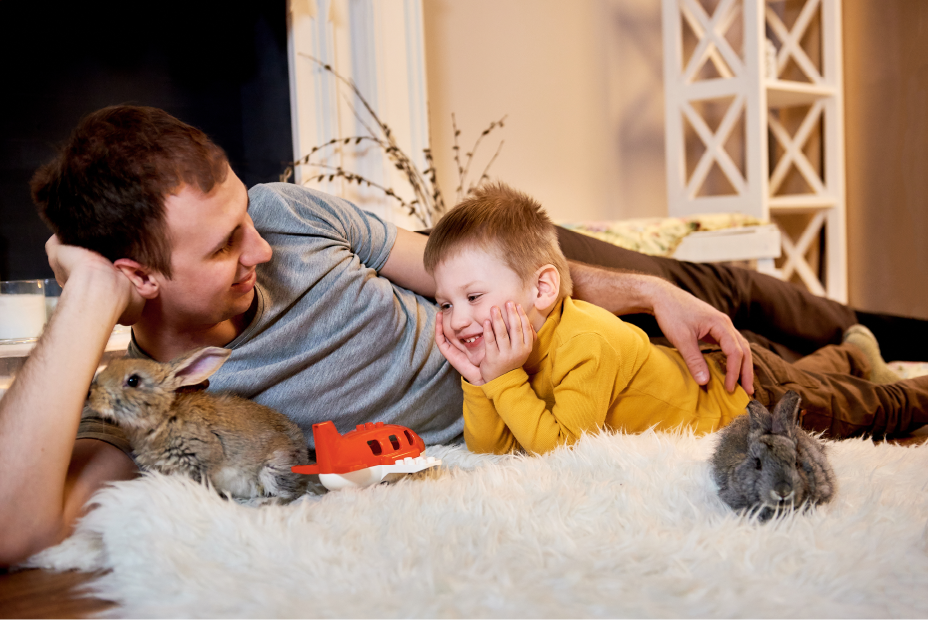Living with a Bunny
Am I ready for a rabbit?

If you have never owned a rabbit, you may find that they are a lot more work than you might expect. Rabbits can live 10-12 years with proper care. Their diet is strict, and they need daily exercise and socialization. Rabbits can be wonderful house pets, but you need to know what to expect before bringing one home. Things to consider are:
- the activity level of your home
- the ages of your children
- the other pets that live in the house
- the number of hours you spend away from home
Rabbits prefer a gentle, quiet living environment. Consider the noise level of your environment before fostering or adopting.
Rabbits are Intelligent!
Rabbits make wonderful house pets! They can be litter box trained and are very sociable. Rabbits live an average of ten years and need the same dedication as it would take to have a cat or dog. If you have not had a rabbit as a house pet, a good resource of information is the House Rabbit Society web site located at www.rabbit.org. In addition, Orlando Rabbit Care and Adoptions (ORCA) is available to answer any questions you have about rabbits.
Although they are quiet, they DO communicate!
Rabbits do not have a voice to let you know they are hungry, hurt or lonely. However, they do communicate non-verbally through an amazing display of body language. Every rabbit has his or her own unique personality. When allowed to become a part of the family, the complexity of their behaviors and emotions is amazing. For example, they might stomp their back feet when they are on high alert or scared and they might grind their teeth when they are happy and content.
They may look like a stuffed toy, but they are not!
Rabbits, like other domestic pets, however, are not toys for children. They are physically delicate with fragile bones and require specialized and sometimes expensive veterinary care. Children are naturally energetic and loving; but "loving" to a small child means holding, cuddling, or carrying an animal around. Rabbits are prey animals, which means that their instincts equate being picked up and handled with being snatched by a bird or other animal for food. Obviously, this is precisely the things that frighten most rabbits. Rabbits can't cry out when distressed. Instead, they may start to scratch or bite to protect themselves from well-meaning children. Thousands of bunnies are abandoned to animal shelters -- or worse - for this reason. Unfortunately, because rabbits are often seen in the eyes of a child as a stuffed toy to play with, they are also often mis-handled or dropped, accidentally resulting in broken legs and backs and causing serious injured or death by children who do not understand the difference. If acquiring a rabbit as a pet for a child we highly recommend that the child be around 9 years or older before pet guardianship is considered. While rabbits may be appropriate family companions, for the bunny's safety, an adult should be the primary caretaker.
Bunny Basics 101
- Keep your bunny housed indoors within an air conditioned and heated area so they are considered a fully indoor family member (we do not recommend that a domestic bunny be permitted outdoors).
- Give your bunny access to unlimited hay and fresh water from a bowl. Supplement their diet with pellets and fresh greens daily.
- Children should be close to or over the age of 8 or 9, but an adult should be the primary caretaker.
- The bunny may be kept in an enclosure but should be allowed daily run time of a minimum of 3-5 hours. Free roaming your rabbit is a wonderful option for your bunny and you can learn more about it on our Habitat & Litterbox section.
- Bunny parents should be willing to seek appropriate veterinary care for the bunny when needed. As responsible pet owners, we must do our part to keep the pet population under control. Spaying or neutering a rabbit prevents unwanted pregnancies and aids in litter box training and controlling aggression, as well as preventing other serious health issues.